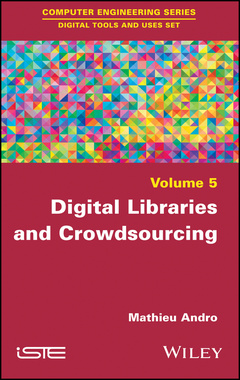Digital Libraries and Crowdsourcing
Auteur : Andro Mathieu

Instead of outsourcing tasks to providers using labor-intensive countries, libraries around the world increasingly appeal to the crowds of Internet users, making their relationship with users more collaborative . These internet users can be volunteers or paid, work consciously, unconsciously or in the form of games. They can provide the workforce, skills, knowledge or financial resources that libraries need in order to achieve unimaginable goals.
Preface ix
Introduction xiii
Chapter 1 A Conceptual Introduction to the Concept of Crowdsourcing in Libraries: A New Paradigm? 1
1.1 A rapidly growing economic model 1
1.1.1 What made this new economic model possible 1
1.1.2 Application to digital libraries 5
1.1.3. Growing interest from politicians, Internet users and academics 7
1.2 Origin, definition and scope of crowdsourcing 10
1.2.1 Explicit crowdsourcing: using volunteers 16
1.2.2. Implicit crowdsourcing: using involuntary and unconscious work .. 16
1.2.3 Gamification: using players 16
1.2.4 Paid crowdsourcing: using microemployees 16
1.2.5 Crowdfunding: institutional “begging” 17
1.3 Historical chronology of crowdsourcing 17
1.4 Philosophical and political controversies 21
1.5 Economic, sociological and legal consequences 33
1.5.1 Economy of crowdsourcing 33
1.5.2 The users of crowdsourcing 39
1.6 Managerial, library science and technological consequences 41
1.6.1 The cultural factor 41
1.6.2 The corporatist factor 41
1.6.3 The reign of the amateur: toward mediocracy? 44
1.6.4 Crowdsourcing: the highest stage of outsourcing? 45
Chapter 2 Overview of Several Crowdsourcing Projects Applied to the Digitization of Libraries 49
2.1 Putting content online and participative curation: the Oxford’s Great War Archive and Europeana 1914–1918 49
2.2 Digitization on demand in the form of crowdfunding applied to digital libraries: the European eBooks on Demand network 50
2.3 Printing on demand (POD): the Espresso Book Machine 63
2.4 Participative OCR correction and participative transcription of manuscripts 70
2.4.1 Explicit crowdsourcing: volunteer correction/transcription 73
2.4.2 Gamification, OCR correction through play: Digitalkoot (National Library of Finland) 83
2.4.3 Implicit crowdsourcing: involuntary OCR correction via reCAPTCHA in the service of Google Books 86
2.4.4 Paid crowdsourcing: the Amazon Mechanical Turk market place 92
2.5 Folksonomy, cataloguing and participative indexing 108
2.5.1 Explicit crowdsourcing through volunteer tagging: Flickr: the Commons 108
2.5.2 The use of gamification: Art Collector 109
Chapter 3 Overview and Keys to Success 117
3.1 Typologies and taxonomies of projects 117
3.1.1 Explicit crowdsourcing 128
3.1.2 Implicit crowdsourcing 128
3.1.3 Gamification 129
3.2 Communication and marketing for recruiting volunteers 136
3.3 The question of motivations 139
3.3.1 Intrinsic motivations 142
3.3.2 Extrinsic motivations 144
3.3.3 The opposition between intrinsic and extrinsic motivations 145
3.3.4 The specific motivation of gamification projects 146
3.3.5 Crowdsourcing and rewards 147
3.3.6 Other theories on motivation 149
3.3.7 The motivations of cultural institutions and the prerequi-sites for launching a crowdsourcing project 151
3.4 Sociology of the contributors and community management 154
3.4.1 Sociology of contributors 154
3.4.2 Crowdsourcing or community sourcing? 156
3.4.3 The work of professionals on these projects and community management 157
3.5 The question of the quality of the contributions 161
3.5.1 Systems for evaluating and moderation of contributions 162
3.5.2 Comparison between the quality of the data produced by amateurs and that produced by professionals 166
3.5.3 Reintegration of the data produced 168
3.5.4 The legal status of contributions: crowdsourcing and the semantic web 169
3.6 The evaluation of crowdsourcing projects 170
3.6.1 Factors in success and failure 172
3.6.2 Quantitative evaluation of crowdsourcing projects and their costs 174
3.7 Change management 178
Conclusion 183
Bibliography 185
Index 203
Date de parution : 03-2018
Ouvrage de 240 p.
16.5x23.9 cm
Mots-clés :
introduction; ix; paradigm; crowdsourcing; conceptual introduction; new; concept; possible; application; libraries; politicians; definition; implicit; involuntary; players; microemployees



